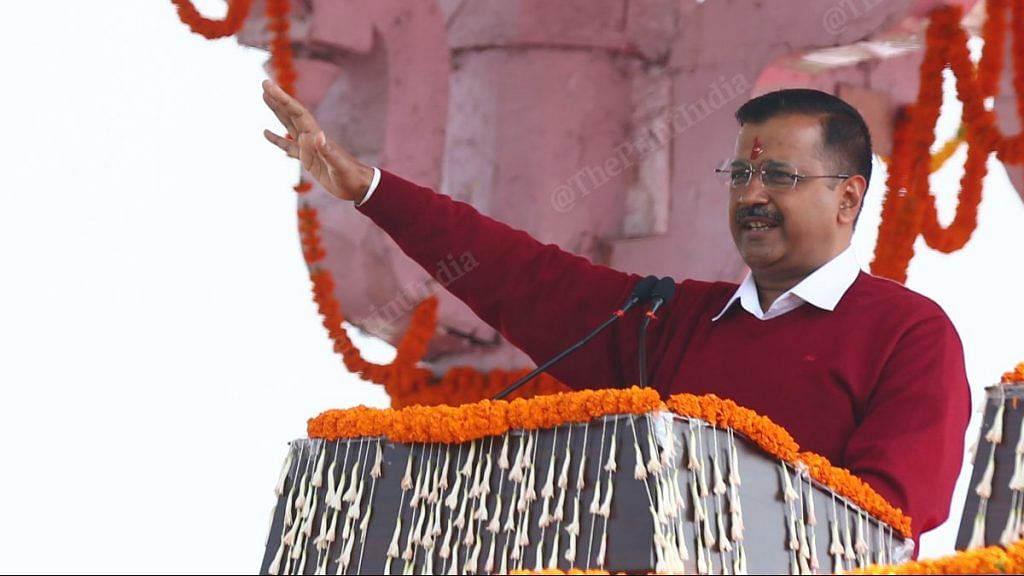Chief Minister Arvind Kejriwal is the alternative to the BJP in Delhi. This myth has been shattered in the last few days with the Delhi riots and his government’s nod for Kanhaiya Kumar’s prosecution.
After the Aam Aadmi Party’s strong victory against the BJP in the Delhi election last month, many were imagining Kejriwal to be the David who could vanquish the Goliath-like Narendra Modi and Amit Shah, eventually. But the riots in Delhi have made many on Kejriwal’s side question him. With his inaction during the riots and nod to Kanhaiya Kumar sedition case, people are asking if the AAP is just another version of the BJP — a BJP-lite, with a tad less of Hindutva.
The BJP made Shaheen Bagh a flashpoint, where it tried to show the AAP as a Muslim-loving party which was neither distancing themselves nor lending support to the movement. But Kejriwal steered clear of it all, spoke of development and threw in a dash of Hanuman chalisa to douse the ‘bad Hindu’ vibes that the BJP was sending his way. Many, like me, thought it was a smart move. He contained and brought back those on the fence to his side.
But Arvind Kejriwal’s inertia during the Delhi riots, which took place in the capital of India in broad daylight, has many doubting his ‘secular’ credentials. It will never be forgotten that Kejriwal was the chief minister of Delhi while 42 people were mercilessly killed and 200 lay injured in hospitals. Yes, the Delhi Police comes under Home Minister Amit Shah, but that in no way absolves the sitting chief minister of choosing to pray at the Raj Ghat for peace instead of going to the ravaged ‘mohallas’ and being with his party workers at ground zero.
Kejriwal was seen meeting Shah and reposing his faith in the Delhi Police. Since the violence didn’t ebb post the meeting with Shah, Kejriwal was finally seen asking for the Army to be brought in. The request evidently fell on deaf ears. So, is Kejriwal really the alternative to the BJP since he did not do much for Muslims who voted for him en masse?
Also read: Kejriwal is wrong. Delhi to Gujarat, outsiders blamed in riots, but most victims know attackers
A dilemma for Kejriwal
Arvind Kejriwal is now in a predicament. And he has himself dug this hole.
The five Muslim-dominated constituencies of Ballimaran, Matia Mahal, Seelampur, Okhla and Mustafabad were swept by the AAP. But perhaps the damage to AAP isn’t much after all. Just five constituencies might come as a small price to pay for Kejriwal when his winning number this election is 62 seats.
But then the obvious question is, why vote for Kejriwal at all? What is he doing differently from the BJP? The whole development shtick of Kejriwal will always be Modi’s brain-child, who started it with ‘sabka saath sabka vikas‘. It was Kejriwal’s antics against the BJP and the Congress as the ‘aam aadmi’ who spoke truth to power that made him the nation’s sweetheart.
But today’s Kejriwal, who had once called PM Modi a psychopath and said Delhi will choose its CM not Amit Shah, lies at the mercy of them both. It is this example of Kejriwal’s volte-face that can be a learning curve for voters in the upcoming elections in Bengal, Bihar and Assam. West Bengal CM Mamata Banerjee is conspicuously silent. The Congress remains a party of mere lip-service with no on-ground assistance to victims. The Left has almost left the political landscape of India and exists somewhere in the digital algorithms of social media. The BJP evidently remains the only party ‘with power’ worth voting for.
Also read: Delhi CM Kejriwal announces peace initiatives, compensation for riot victims
Echoes from 2002
The escalation of a riot right after the Delhi election is a huge message to India. The focal point of India’s election cycle will always remain religion. And anyone trying anything other than that will eventually fall in line. Kejriwal has proven that and underlined it by not doing the most obvious thing expected out of him after a communal riot – showing concern, asking for accountability, stepping up to the occasion by visiting charred localities and meeting victims.
Kejriwal has resorted to what the Congress did post Gujarat riots in 2002. When the Congress came back to power in the Centre in 2004, it did nothing to help out the victims. And it cost the Congress heavily in the 2007 Gujarat Assembly election after Modi spoke of ‘Gujarat pride’ and won easily that year in the state’s assembly election even after Sonia Gandhi called Modi a ‘maut ka saudagar (merchant of death)’. And the domino effect of the silence of Congress in 2002 was seen in 2014 too. The Congress did not speak of the injustice done in Gujarat openly since it was in power at the Centre and didn’t want to push accountability for something it apparently had no control over. This is the same justification that the AAP is trying to use to absolve itself of any responsibility in the Delhi riots.
Just how 2002 set the ball rolling for Modi who brought communal politics to the forefront and fashioned himself as the penultimate Hindu leader, so will 2020. Hindus-vs-Muslims is here to stay as an election agenda.
Only time can tell whether Kejriwal will be able to dodge this bullet. But one thing is for sure. He is repeating the mistakes of the Congress. And that can cost him dearly.
The author is a political observer and writer. Views are personal.
